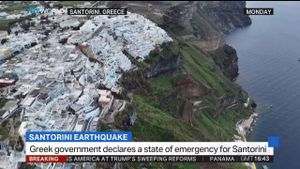The Libyan oil sector is facing severe challenges as the nation grapples with political instability and infrastructure inadequacies, significantly impacting the production and economy. With the asset contributing about 97% of the government's revenue, the stakes couldn't be higher.
According to Mustafa Sanalla, chairman of the Libyan National Oil Corporation (NOC), "Our production is now at its lowest level due to many factors, but primarily due to the unstable political climate." The NOC has been tasked with overseeing the nation’s oil operations, yet persistent conflicts and blockades have hindered even the most basic operations.
Recent months have highlighted the growing concern over declining production levels. Several major oil fields, especially those within the Sirte basin, which is pivotal for both national output and foreign investment, are experiencing lengthy closures and reduced operations. Economic analyst Samir Fathi remarked, "Without foreign investments, we cannot restart the growth needed to recover from the years of conflict." His words reflect the broader sentiment among industry insiders who recognize the urgent need for outside capital.
The dire situation has been exacerbated by internal disputes and the emergence of militias threatening the safety of oil infrastructure. This uncertain environment has made foreign companies increasingly wary of investing, leading to stagnation within the sector.
Historically, the Libyan oil sector has witnessed varying degrees of stability, but the current turmoil has raised flags across the international community. The government’s inability to mediate conflicts has left key sites unsecured, marking Libya as one of the more hazardous territories for investment.
Infrastructure failures also plague the industry, especially with aging pipelines and facilities desperately needing upgrades. This situation renders production not only inefficient but also risky, as any sudden disruptions could lead to significant financial losses. Sanalla’s assertion on the inadequacies of current operations underlines the urgent need for technological upgrades and repairs.
The road to recovery for the Libyan oil sector is riddled with challenges, not the least of which is the political quagmire engulfing the nation. Without addressing the underlying issues of governance and security, it remains unlikely for the oil production to stabilize long enough to attract the necessary foreign investments.
Even as Libyans watch the declining oil production figures, the world continues to follow closely. Analysts predict the potential fallout of such instability on global oil prices, which remain vulnerable to shocks from conflict-ridden regions.
Finding viable solutions calls for both local stakeholders and international partners to navigate this complex web of challenges. The NOC is eager to stabilize the situation, but they cannot do so alone. External pressure and partnerships could be the key to revitalizing Libya’s oil output.
Moving forward, the stability of the oil sector will undoubtedly play a pivotal role not just for Libya's economy but for global energy markets at large. The question remains how quickly the political system can regain control and restore confidence among foreign investors.
With the clock ticking on Libya's economic recovery, both local authorities and the international community must act urgently to pave the way for rebuilding and revitalizing the nation's core asset—the oil sector.



